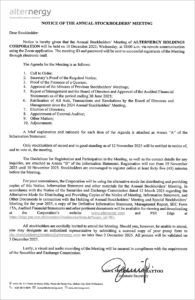By Aubrey Rose A. Inosante and Justine Irish D. Tabile, Reporters
CABINET changes are unlikely to quickly restore investor confidence in the Philippines as the government pursues a high-profile corruption probe, analysts said.
The Cabinet reshuffle that shed key members of the economic team is still far from investors’ call for the prosecution of involved personalities in the flood control mess, Michael Henry Ll. Yusingco, a fellow at the Ateneo de Manila University Policy Center said.
“I think investors will be more confident when they see all the personalities involved in the pork barrel corruption indicted and prosecuted,” he said in a Facebook Messenger chat on Tuesday.
“The resignations of the relevant department secretaries by themselves contribute very little to the prosecution effort.”
President Ferdinand R. Marcos, Jr. on Monday named former Finance Secretary Ralph G. Recto as the new Executive Secretary, following the resignation of Lucas P. Bersamin and Budget Secretary Amenah F. Pangandaman.
Ms. Pangandaman’s exit followed accusations made by former Party‑list Rep. Elizaldy S. Co, who was allegedly directed to make P100 billion worth of insertions.
Mr. Yusingco also said the investors may not take the reshuffle as a “good sign” that the administration is serious in addressing the corruption problem, given that he did not replace them with new people.
“He merely shuffled people from within his cabinet, which means they could also be linked to the pork barrel corruption,” he added.
For his part, Ibon Foundation Executive Director Jose Enrique “Sonny” A. Africa described the resignations as “clearly defensive” and it confirmed how high up corruption reaches in government.
“They are so highly positioned that it is no longer tenable to presume that their principal, the president, is not implicated,” he said.
“Animal spirits in the economy are shaken up beyond any political crisis in the post-dictatorship era and demands even more decisive accountability and action to be restored.”
Mr. Africa also said this will worsen the economic slowdown that has actually been slowly unfolding since even before the pandemic lockdowns.
Meanwhile, Hansley A. Juliano, a political science lecturer at the Ateneo de Manila University, said Mr. Marcos seems to promote political allies who achieve results related to his term agendas.
“This isn’t much a reshuffle as it is ultimately a consolidation,” he said in a Facebook Messenger chat on Nov. 17.
NO DISRUPTIONSPalace Press Officer Clarissa A. Castro on Tuesday said the administration remains committed to meeting economic targets and maintaining investor confidence.
She assured that the reassignments, including former economic czar Frederick D. Go’s transfer to the Finance department, involve personnel already familiar with budget processes. Mr. Marcos also tapped Budget Undersecretary Rolando U. Toledo as officer-in-charge of the department.
“There will be no problem with the timely passing of the 2026 budget,” she added.
The country is deliberating its 2026 spending plan, with President Ferdinand R. Marcos, Jr. expected to sign it before the year ends.
The corruption scandal is deeply tied to the national budget, with insertions worth billions of pesos in public work projects under scrutiny, prompting concerns from both lawmakers and business leaders.
Business groups have publicly voiced dismay at the ongoing controversies, warning that they disrupt operations.
Ms. Castro noted that while calls for public hearings are legitimate, making them widely public can also create instability.
She also framed Mr. Marcos’ anti-corruption efforts as a stabilizing factor for business: “Investors should trust the current administration because the President is fighting corruption and government anomalies.”
American Chamber of Commerce of the Philippines (AmCham) said the response from the business community to new appointments has been “positive.”
“We remain confident that the administration will take the necessary steps to uphold good governance and maintain a stable environment for business and investment,” AmCham Executive Director Ebb Hinchliffe said in a Viber message.
Business groups and investment promotion agencies also said they see the cabinet transitions as key to restoring confidence and stability in the country, as the government tries to address the corruption issue, which has dampened investors’ confidence.
“These transitions come at a crucial time for policy coherence, fiscal stability, and investor confidence,” FPI Chair Elizabeth H. Lee said in a statement on Tuesday.
“FPI affirms its support for continuity and coordination across government agencies to sustain economic momentum,” she added.
The Philippine Chamber of Commerce and Industry (PCCI) commended the appointments and called them “key selections which come at a critical time for our economy.”
“Executive Secretary Recto brings a wealth of legislative and policy expertise, while Secretary Go’s strong background in business and investment promotion will be valuable in steering fiscal policy and driving economic growth,” PCCI President Enunina V. Mangio said in a statement.
Federation of Filipino Chinese Chambers of Commerce and Industry, Inc. (FFCCCII) said under the guidance of Mr. Recto and Mr. Go, the country is expected to see “vigorous pursuit of progressive socio-economic reforms.”
“Their ascension to these pivotal roles is not merely a change of personnel; it is a powerful affirmation of the nation’s commitment to placing its most capable stewards at the helm of our economic destiny,” FFCCCII President Victor Lim said in a statement.
He also said the organization, which represents 170 Filipino Chinese chambers of commerce and other diverse trade organizations, pledges its full and unwavering cooperation to reforms and policies for justice, progress and stability.
Meanwhile, the Philippine Industrial Estates Association, Inc. (PHILEA) said that Secretary Go’s appointment “is a significant boost to the Philippine investment landscape.”
“His commitment to enhancing the country’s competitiveness aligns closely with PHILEA’s mission of attracting long-term, high-quality investments that generate jobs, expand exports, and support sustainable industrial development,” PHILEA President F. Francisco “Chito” S. Zaldarriaga said in a statement.
“PHILEA stands ready to collaborate with Secretary Go and the Department of Finance (DoF) in advancing policies that strengthen economic zones, stimulate private-sector investment, and reinforce the Philippines’ position as a premier investment destination in the region,” he added.
The IT and Business Process Association of the Philippines (IBPAP) also welcomed the appointment, citing Mr. Go’s roll in the passage of the Corporate Recovery and Tax Incentives for Enterprises to Maximize Opportunities for Reinvigorating the Economy (CREATE MORE) Act.
“Through his unrelenting efforts and understanding of information technology and business process management investors’ challenges on ease of doing business, he ensured that the law delivered complete and clear provisions especially on availment of incentives at the national and local government unit levels,” it said.
The Bases Conversion and Development Authority (BCDA) also expressed its support, noting that Mr. Go’s track record “gives the government a steady hand to strengthen fiscal management, reinforce investor confidence, and translate economic strategy into real gains.”
“BCDA looks forward to working closely with Finance Secretary Go to transform idle US military bases and Metro Manila camps into productive districts that boost national and local economies, empower communities, and expand opportunities for more Filipinos,” it said.
Meanwhile, the Philippine Economic Zone Authority (PEZA) welcomed the two officials’ appointments, citing their support for the economic zone program and policies that foster investment and create jobs.
“PEZA looks forward to deepening our collaboration in advancing the ecozone agenda and driving sustainable, innovation-led growth for the Philippines.” — with Chloe Mari A. Hufana






